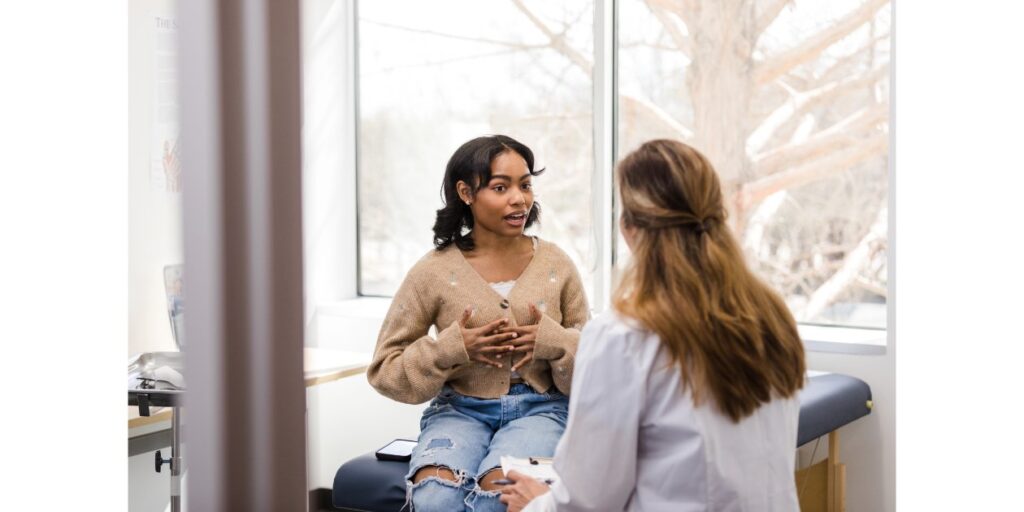Growing up as a girl is an interesting process—especially when puberty hits. It can be a lot all at once, we know. But today, the Memphis Obstetrics and Gynecological Association wants to answer this question: What changes should every girl expect during puberty?
What is Puberty?
Puberty for biological females is the stage of development where girls experience both physical and physiological changes, marking the transition from childhood to adulthood. It’s an extremely complex process, typically occurring during a window between the ages of 8 and 13.
What Puberty Looks Like
The following significant shifts will occur, physically, emotionally, and hormonally. The exact rate and order of these things varies immensely from girl to girl, which is important to remember.
- Breast Development: One of the earliest signs of puberty is the development of breast buds. They gradually increase in shape and size as they enter teenagehood and even adulthood.
- Menstruation (Menarche): Menarche is the first menstrual period. It’s a major milestone and can be startling without proper feminine health education. It typically occurs between the ages of 9 and 16, with an average age of around 12. It is part of the body’s cycle in preparation for potential pregnancy.
- Growth Spurt: There is usually a rapid growth spurt during puberty, with an increase in height. Hormones directly influence this growth.
- Pubic Hair Growth: Pubic hair grows in the genital area, starting fine and growing more coarse. Hair also begins to grow under the arms and on the legs.
- Skin Changes: Hormonal shifts inevitably affect the skin. Increased oil production can lead to changes in complexion, and acne is a fairly common experience.
- Emotional and Psychological Changes: It’s vital to remember this is not just a physical process. Mood swings can occur, as well as increased self-awareness, and the development of personal identity and sexuality. An increase in estrogen production is partially responsible for these shifts.
- Development of Reproductive Organs: Internally, changes are also happening. The uterus and ovaries play a key role in the menstrual cycle, and therefore develop along with the rest of the body.
- Voice Changes: While not as distinct as in boys, voice pitch can still shift in girls.
- Body Fat Redistribution: An increase of fat deposits appears in the hips and thighs.
- Hip Widening: The pelvis will gradually widen, which is another natural part of the body preparing for potential childbirth.
Education is Key
The internet is a resource that obviously wasn’t always available, but can certainly be an asset for girls in terms of learning about their bodies and the changes they are experiencing. The key is to find healthy, professional, and reliable sources. Here are other factors of education that are crucial:
- Menstrual Health Education: Letting girls know this is a normal thing that will happen to them is important. This includes explaining the menstrual cycle, its purpose, and its management— especially the proper use of sanitary products and hygiene practices.
- Emotional Wellbeing: Mood shifts are often difficult. Addressing this aspect of growing up is essential. Normalizing these changes and emphasizing self-love are both excellent practices as a parent or role model.
- Open Communication: It can be awkward for young people to talk about these things. But girls should feel absolutely safe and comfortable asking questions and discussing their experiences from trusted adults: Parents, guardians, older female siblings, or healthcare professionals, in particular.
- Respecting Differences: Always promote an awareness and respect for the contrasting experiences of girls during puberty. Acknowledging the differences in the rates of change instills a safe environment for girls around one another.
- Reproductive Education: Basic education about reproductive health, including the female reproductive system, ovulation, and fertilization, provides girls with a foundational and objective understanding of reproductive capabilities.
- Enforcing Boundaries: While communication is key, so is privacy. Every girl is entitled to her own body and identity. If she is willing to discuss this process with only one or two trusted people and a medical professional, that is more than enough. It’s important to communicate that she should never feel pressured by others to disclose personal information.
- Puberty Education Programs: Schools, community organizations, and healthcare providers can implement this manner of program, covering a range of topics related to female development. These are extremely helpful in fostering conversation through interactive sessions, educational materials, and additional resources for both girls and parents.

Finding A Resource
As medical professionals who specialize in female health, we understand how innately strange this process is. Many of us have either experienced it firsthand or maybe even have children who have. But it is normal, it is healthy, and it should not be stigmatized. At this age, girls will most likely have a pediatrician as their primary medical resource—but they can always recommend specialists like us if further questions or issues arise. We are happy to support young women as they grow. You can reach any of our offices (Wolfchase, East Memphis, Germantown, and DeSoto) at 901-843-1500 to schedule a Well Woman Visit.



